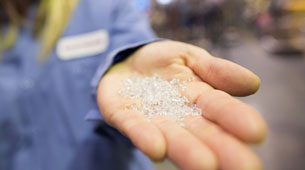Green tie-ups: Interzero/Eastman in PET waste supply agreement for recycling facility in France; Borealis/ITC Packaging launch sustainable/food contact rigid packaging

Recycler Interzero Plastics Recycling, as part of Interzero, and US chemical firm Eastman have entered into a long-term supply agreement for Eastman's previously announced molecular recycling facility in Normandy, France. Interzero will provide up to 20,000 tonnes/year of hard-to-recycle PET household packaging waste that would otherwise be incinerated.
Headquartered in Germany, Interzero is a leading service provider of circular solutions in Europe and is strongly connected to its sister company Alba Group Asia both led by Chairman/Shareholder, Dr. Axel Schweitzer.
Eastman's planned molecular recycling facility in France will become the world's largest material-to-material molecular recycling plant. Once complete, the facility will recycle approximately 160,000 tonnes/year of hard-to-recycle polyester waste. The project is expected to be operational in 2025.
Chemical recycling is a necessary complement to mechanical recycling to keep more raw materials in the loop. Both companies are committed to creating material circularity. Eastman's facility in France will process coloured and opaque PET waste that cannot be recycled mechanically to create clear and transparent rPET upon completion.
"Eastman is a leader in molecular recycling with decades of innovation expertise. Joining forces by combining the leading know how of Eastman and Interzero is the next step in closing the loop with our partners and a step closer towards a world without waste," said Jacco de Haas, chief commercial officer at Interzero Plastics Recycling. "The world is facing a plastic waste crisis with far too little plastic waste being recycled, either from lack of collection or because it simply cannot be recycled by traditional methods. Eastman's innovative process and this agreement bring a solution to this."
"Interzero and Eastman are committed to reducing plastic waste and creating circularity through collaboration and innovation," said Brad Lich, Eastman executive vice president and chief commercial officer. "This agreement marks an important milestone towards Eastman's investment in France. We are happy to build a strong collaboration in Europe with Interzero to provide a portion of the feedstock needed to successfully operate our facility. The collaboration reinforces the complementary nature of mechanical and molecular recycling, and the importance of working together to create true circularity."
Eastman's proven polyester renewal technology provides true circularity for hard-to-recycle plastic waste that remains in a linear economy today. This material is typically incinerated because it either cannot be mechanically recycled or must be downcycled using existing technology. Eastman's chemical recycling technology allows this hard-to-recycle waste to be broken down into its molecular building blocks and then reassembled to become first-quality material without any compromise in performance. Eastman's polyester renewal technology enables the potentially infinite value of materials by keeping them in production, lifecycle after lifecycle. With the technology's inherent efficiencies and the renewable energy sources available in France, materials can be produced with significantly less greenhouse gas emissions than traditional methods.

In other news, Austrian chemical firm Borealis and Spain’s ITC Packaging, a manufacturer of thin wall packaging for food-contact applications, have jointly developed a series of new and more sustainable rigid packaging formats that are suitable for food contact. The partners used resins from Borealis’s Borcycle C and Bornewables portfolios to upgrade a number of iconic food packaging formats found on European supermarket shelves, primarily in the ice cream and ready-to-eat segments. These more sustainable formats containing chemically recycled polypropylene (rPP) and renewable-based PP were launched in record time in the course of 2022.
Brand owners and converters are keen to find ways to reduce their carbon footprint by enhancing the sustainability of their packaging. At the same time, ensuring the safety of food-contact packaging is crucial. Grades in the Borcycle C portfolio guarantee the high purity and safety required for food-contact applications because they are gained through the chemical recycling process, which turns plastic waste which is difficult to recycle back into virgin-grade materials. Grades in the Bornewables portfolio are composed of renewably-sourced feedstocks derived from residue and vegetable waste streams.
Because both Borcycle C and Bornewables grades are composed of ISCC PLUS-certified (International Sustainability & Carbon Certification) sustainable feedstock produced in accordance with the mass balance method, using them enables manufacturers and brand owners to reduce the CO2 footprint of their packaging formats. As these grades are virgin-grade resins offering the same high purity and performance as polyolefins made using fossil fuel-based feedstocks, they offer the added bonus of not requiring grade revalidation, because they can be used as drop-in solutions.
“As packaging pioneers, ITC has always been at the forefront of innovation. Our long-term strategic partnership with Borealis has enabled us to consolidate our position as sustainability trailblazers in the European rigid packaging industry,” says Jose Luis Olmedo, ITC Packaging Managing Director. “Our ultimate aim is to maintain high food safety standards while implementing an added-value circular economy model that meets market demands. This is what strengthens our relationships to both our customers and value chain partners.”
“Working together with ITC in the spirit of EverMinds has allowed us to identify and implement the ideal technologies and material solutions for making rigid PP packaging food-contact compliant yet more circular,” says Peter Voortmans, Borealis Global Commercial Director Consumer Products. “Building on the success story with Bornewables and Borcycle C, Borealis and ITC are now exploring the use of mechanically recycled compounds from the Borcycle™ M portfolio to further reduce the carbon footprint of ITC’s non-food packaging. This is how we advance value chain collaboration to close the loop on plastics circularity and at the same time underline how we manage to re-invent essentials for sustainable living.”
(IMA)Subscribe to Get the Latest Updates from IMA Please click here
©2022 Injection Moulding Asia. All rights reserved.

















